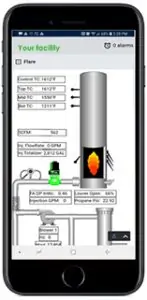

Do you glaze over when the tech-speak starts? In our blog, we’ll try to prevent that from happening while describing new technology for landfills and industrial use. We’ve merged our SCS Engineers technology with some new web-based technology that will make your landfill, facility, or plant safer for workers and help lower operational costs. Not only that, with SCS Dataservices® (already on over 600 landfills) you will have a complete and accurate record at your disposal.
You can find information on our website, but here we describe the most exciting new Remote Monitoring and Control (RMC) options:
SCS owns a small fleet of no-crew aerial vehicles (UAVs) and employs licensed UAV pilots nationwide. The use of UAV technology, commonly known as drones, can produce photogrammic and aerial photographic imagery offering site owners and operators the ability to take measurements from photographs, especially useful for recovering the exact positions of surface points quickly and efficiently. Some of the benefits of UAVs are:
SCS deploys UAV technology on a case-by-case basis as an adjunct to our RMC® services. We also offer to consult and training on the implementation of UAV programs at solid waste and other facilities.
SCS can also present real-time data in mixed reality environments (e.g., Microsoft HoloLens2). Augmented 3D facilitates the difficult task of visualizing actual and conceptual site conditions. Another application of reality technology includes analyzing landfills in more than three dimensions by combining multiple datasets. These 4D models enable operators to view conditions over time, providing the ability to detect and measure changes and insight into the benefits of critical infrastructure such as earthworks and systems. One could add costs as a 5th dimension to visualize the resources, time and money needed to move solid materials.

The SCS RMC® team integrates web-based technology called Ignition 8 into our client solutions. An Inductive Automation product, Ignition 8 enables us to build dynamic industrial applications that automatically respond to each client’s unique perspective.
Ignition Perspective enables us to build full SCADA, HMI, and alarm systems, and provide clients with a mobile view of their operations via smartphones and other mobile devices. Full-control of industrial processes is more mobile, customizable, scalable, and secure than ever before. For example, one of our clients uses advanced SCS RMC® – Ignition Perspective HTML 5 integration for remote access and control of piping and instrumentation diagrams that stream live sensor data. The application reduces O&M costs by:
Read Waste Today’s article Using Drones for Landfill Monitoring to learn more.
On October 11, SCS Engineers’ David Hostetter and Phil Carrillo present several case studies during the webinar demonstrating how Remote Control Monitoring (RMC) has lifted the burden of data collection and facilitates the review and analysis of data for use in decision-making.
In this webinar, several case studies regarding remote monitoring and control (RMC) systems for landfill gas and leachate systems will be presented. This includes a description of integrated systems which are used for data collection and analysis and how they were used to identify, troubleshoot and solve real problems in an effective and efficient manner.SCS recognized this as an issue in the industry and developed systems to streamline the process using the latest technology to help perform routine, sometimes complex, data analysis, and to automatically push reports and alerts to operators, engineers, and project managers. This has been a dramatic change that removes human error while reviewing pages of data and allows people to focus on what really matters.
RMC systems give the ability to:
Watch Dave’s video here: https://www.youtube.com/watch?v=pYezcobr1Cg
Dave explains how landfill owners/operators use SCS RMC® to view, operate, and control field equipment. The presentation covers how SCS RMC® helps to reduce operating costs – sending technicians to respond when necessary to alerts from flare systems, leachate systems, and air quality sensors. SCS helps manage all field resources and personnel better while enhancing reporting and data management too.
Register for the EREF webinar here: https://erefdn.org/event/remote-monitoring-and-automating-processes-at-landfills/
Over years of working on operations and maintenance of landfill gas collection and control systems and leachate management systems, SCS found that too many times data is collected and no one has the time to review and analyze it for improved decision-making.
As an industry-wide issue, SCS developed systems to streamline the process using technology and our field expertise to help perform routine and sometimes complex data analysis and to automatically push reports and alerts to operators, engineers, and project managers.
The improvements are dramatic; by removing human error from reviewing pages of data we now focus our time and energy on what really matters, using what the data tells us to make informed decisions. Let’s put the technology into the context of everyday operations – identify, troubleshoot, and solve landfill gas and leachate challenges.
This SCS paper illustrates several sites using integrated systems for data collection and analysis and how they are used to identify, troubleshoot, and solve real problems in an effective and efficient manner.
Privately share this article using the email icon on the left navigation bar. Print the article using the Download icon just under the article, or your browser commands.
About the Authors:
David P. Hostetter, PE, Denver, Pennsylvania
Phil Carrillo, Huntington Beach, California
Darrin D. Dillah, Ph.D., PE, BCEE, Reston, Virginia